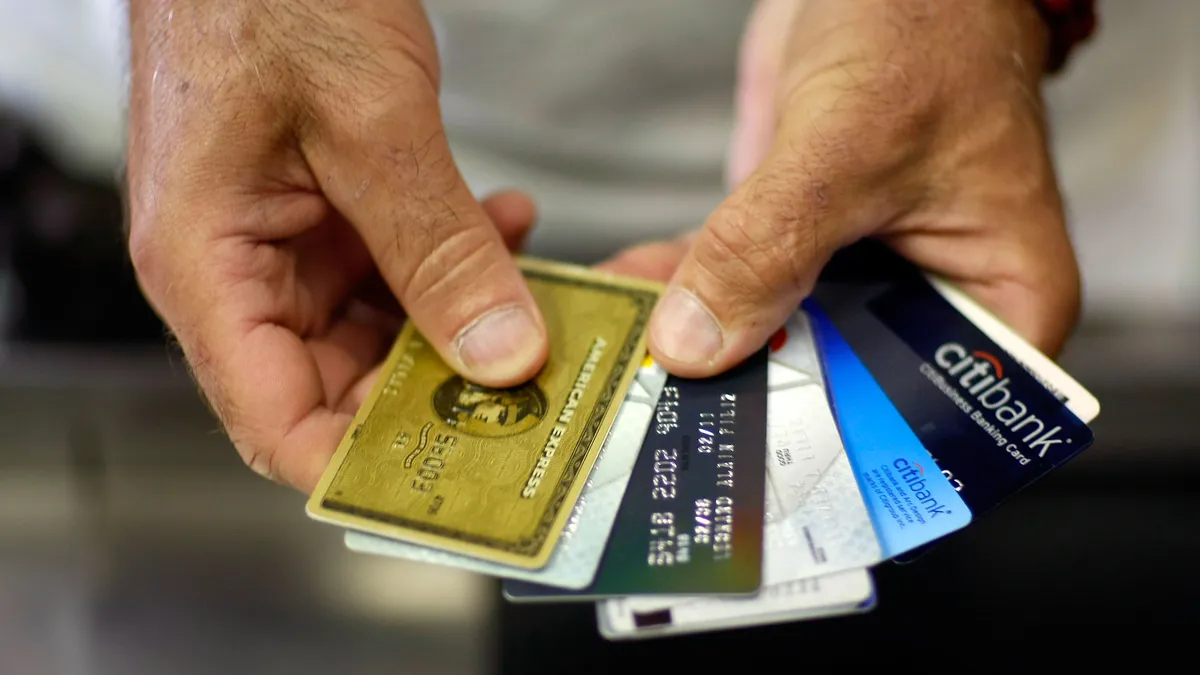Retail sales in January and February indicate a possible pull-back in consumer spending, which some analysts warn is due at least in part to burgeoning credit card debt that could continue throughout the year.
Retail sales in November and December, with some holiday sales pulled into October, beat many expectations this past season; half of consumers planned to fund their purchases with debt. Indeed, in the fourth quarter, credit card debt and delinquency rates surged, with card balances up by $50 billion over the period to reach $1.13 trillion, according to the Federal Reserve Bank of New York’s Center for Microeconomic Data.
“Credit card and auto loan transitions into delinquency are still rising above pre-pandemic levels,” Wilbert van der Klaauw, economic research advisor at the New York Fed, said in a statement. “This signals increased financial stress, especially among younger and lower-income households.”
While last year ended with a record level of credit card debt, adjusted for inflation that was still 10% below the peak in 2008, when the economy was in crisis, according to WalletHub research.
“Nevertheless, if we continue to indulge our urge to overspend, things could get rocky very quickly,” WalletHub Editor John Kiernan said in a statement.
The Biden Administration’s effort to ease student loan debt may be helping some consumers: Delinquency rates increased for all debt types, including mortgages, credit cards and auto loans, but not for student loans, according to the report.
“Record-high credit card balances and record-high credit card rates mixed with diminishing savings are straining many consumers."

Ted Rossman
Senior Industry Analyst, Bankrate
In the segments covered by Retail Dive, retail sales so far this year have enjoyed relatively healthy year-over-year increases, nearly 7% in February and nearly 4% in January.
But consumers, under pressure from higher debt levels and lower savings than this time last year, remain keen on discounts, according to GlobalData research. They also continue to prioritize dining out over acquiring goods, according to emailed comments from GlobalData Managing Director Neil Saunders.
“However, some progress has been made on paying down at least some of the holiday bills and wage growth is now trending above general inflation, so there has been a small uptick in optimism and sentiment,” Saunders said. “This is likely why, even when adjusted for the extra trading day, there was a small uptick in volumes during February. All that said, none of the consumer indicators point to there being a boom in consumer sentiment or spending power over the first part of this year.”
Moreover, retailers may not get much of a boost from tax refunds this year, according to Bankrate research.
"I continue to believe that credit card debt is one of the most important topics in the personal finance world in 2024,” Senior Industry Analyst Ted Rossman said in emailed comments. “Record-high credit card balances and record-high credit card rates mixed with diminishing savings are straining many consumers. Most Americans plan to do something practical with their tax refund this year, such as boosting savings, paying down debt or investing. Comparatively few plan to splurge on retail purchases, home improvements or vacations.”
January data on credit credit debt has already showed a 6% increase year over year, according to WalletHub. Those analysts expect consumers to add another $120 billion to their outstanding balances in 2024, leading to “a good chance we’ll break the all-time record for credit card debt on an inflation-adjusted basis,” Kiernan said.
















